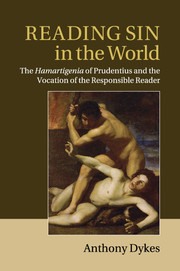Book contents
- Frontmatter
- Contents
- Acknowledgements
- Abbreviations, manuals and works of reference
- Bible texts used
- Classical texts used
- Electronic resources
- The names of biblical characters
- Vocabulary and style
- 1 Introduction: ‘Prudentius counts’
- 2 The world projects human responsibility
- 3 The vocation of the responsible reader: the biblical strategy
- 4 The vocation of the responsible reader: the genre strategy
- 5 Conclusion
- Appendix A A note on the title of the Hamartigenia
- Appendix B A brief note on the date and circulation of the Vulgate Genesis
- Bibliography
- Index
4 - The vocation of the responsible reader: the genre strategy
Published online by Cambridge University Press: 03 May 2011
- Frontmatter
- Contents
- Acknowledgements
- Abbreviations, manuals and works of reference
- Bible texts used
- Classical texts used
- Electronic resources
- The names of biblical characters
- Vocabulary and style
- 1 Introduction: ‘Prudentius counts’
- 2 The world projects human responsibility
- 3 The vocation of the responsible reader: the biblical strategy
- 4 The vocation of the responsible reader: the genre strategy
- 5 Conclusion
- Appendix A A note on the title of the Hamartigenia
- Appendix B A brief note on the date and circulation of the Vulgate Genesis
- Bibliography
- Index
Summary
IS GENRE ESSENTIAL?
The examination of genre is vital to a responsible reading of the Hamartigenia because its genre is uncertain. We can be certain about this uncertainty because the poem presents the reader with a number of contradictory but apparently reliable generic markers. The Hamartigenia is an epiphany of the ambiguity it proposes. It is a replica of the contrasting features found in the world, the ‘bina boni atque mali’ (8), which Marcion misreads. The generic ambiguity of the poem as a whole attempts to provide a replica of the apparent mix of order and disorder in the world post peccatum. The Hamartigenia is, it could be argued, a ‘text of the world’, and a text of a world which, while damaged by sin, is not utterly ruined: it is a world which projects, with apparent inconsistency, both the beauty of God's creation and the ugliness of sin found in that creation. The theist reader of the world is prompted to explain the presence of mala physica in a world created by a God who is proclaimed to be both good and omnipotent: is the world to be thought of as essentially good, despite floods, earthquakes and disasters? Comparable reactions to both the poem and the world are easily imaginable, as the reader is prompted, sometimes cajoled, into making decisions about what sort of poem the Hamartigenia essentially is.
- Type
- Chapter
- Information
- Reading Sin in the WorldThe Hamartigenia of Prudentius and the Vocation of the Responsible Reader, pp. 174 - 244Publisher: Cambridge University PressPrint publication year: 2011



